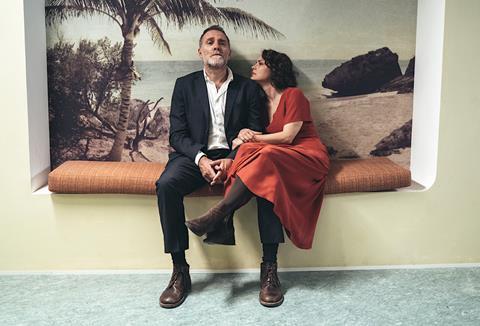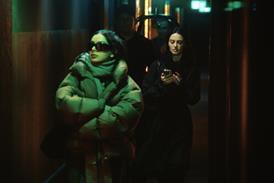Italian actor-turned-director Valerio Mastandrea imagines the rich internal life of coma patients in this hit-and-miss comedy

Dir: Valerio Mastandrea. Italy. 2024. 92mins
Italian audiences have long had a soft spot for Valerio Mastandrea, a Roman actor in the tradition of Alberto Sordi with a world-weary regular-guy face that can switch from comic to melancholic in an instant. Leveraging his stubbly charm to the max in his second film as director, chosen to open Venice’s parallel Horizons section, Mastandrea makes a game attempt to make us believe in a meet-cute, hospital-set rom-com, in which every character of note is in a coma.
Poignant and silly at the same time
Poignant and silly at the same time, Feeling Better has its affecting moments but never fills out its audacious premise with much more than existential meanderings, classic rom-com tropes and some cool overhead camera angles. But, with its likeable happy-sad soundtrack by Icelandic composer Toti Gudnason (who scored Lamb) and good zeitgeist timing – in our fragile post-pandemic times when love and mortality are close bedfellows – Feeling Better could strike a chord, at least among local audiences. It’s certainly more commercial than the veteran actor’s 2018 directorial debut, the small, gritty drama Ride (She Laughs), which also dealt with end-of-life themes in a way that upturned expectations.
There, the targeted orthodoxy was that a young wife should necessarily break down at her husband’s funeral. Here, the belief in question is that we should be happy when someone emerges from a coma. Mastandrea and co-writer Enrico Audenino imagine a world in which coma patients, outside of their fugue-state bodies, roam hospital corridors, walk the streets, hang out in parks, even sign up for organised bus trips. What if they were happier in there? What if they fell in love with one of the other ‘sleepers’, and were terrified of exactly the thing that all their friends and relations are fervently wishing for – that they should return to consciousness, to a world which the non-comatose insist on regarding as the real one?
Feeling Better goes the way of many such high-premise exercises: after an initial sugar-rush of delight, it wades through the treacle of having to actually craft a story. An exhilarating musical-style opening sequence brings the gradual realisation that the besuited but tie-less and unshaven 50-something Roman guy played by Mastandrea (none of the main characters are given names) is actually the out-of-body avatar of a coma patient who he observes, from his own hospital bedside, with a mix of worry and disgust.
Like the other coma patients he testily hangs out with – Lino Mustella’s good-natured klutz, Laura Morante’s sardonic, bitter veteran of the wards – he is invisible to the hospital’s visitors, nurses and doctors. When his comatose alter ego is turfed out of his room to the basement to make space for a new arrival, played with warmth and sensitivity by Argentinian actress Dolores Fonzi, she and Mastandrea’s character engage in an angry stand-off. So we know where that’s going.
One thing Feeling Better has going for it is a deft command of tone, managed not only through a script that takes a less-is-more approach to big emotional moments, but also through colour-coding and a supple use of natural light. The hospital’s drab corridors are brightened by orange panels, suggesting perhaps that the people we meet here are stuck on traffic-light amber. Alongside Gudnason’s more sweet than bitter soundtrack, enough existing tracks to make a soundtrack album are deployed – most stridently in the case of T. Rex’s over-used ’Cosmic Dancer’. There are even some pricey looking special effects connected to the howling gale these half-lifers feel whenever somebody is about to die.
Fine but forgettable, Feeling Better could just tempt a few distributors outside of Italy, and might even drop into a ’alt-rom-com world cinema’ subscription streaming slot. One wishes however that the Italian title, Nonostante, had been translated more literally. ‘Notwithstanding’ would fit the story perfectly.
Production companies: HT Film, Damocle, Tenderstories, with Rai Cinema
International sales: HT Film, info@htfilm.it
Producers: Viola Prestieri, Valeria Golino, Francesco Tato, Oscar Glioti, Moreno Zani, Malcolm Pagani
Screenplay: Enrico Audenino, Valerio Mastandrea
Cinematography: Guido Michelotti
Production design: Roberto De Angelis
Editing: Chiara Vullo
Music: Toti Gudnason
Cast: Valerio Mastandrea, Dolores Fonzi, Lino Musella, Giorgio Montanini, Justin Alexander Korovkin, Barbara Ronchi, Luca Lionello, Laura Morante






















